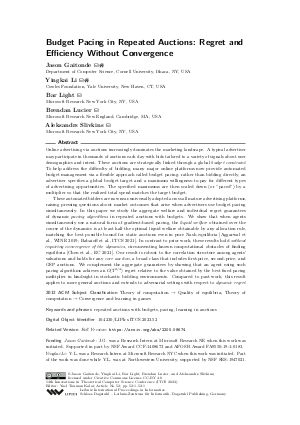Budget Pacing in Repeated Auctions: Regret and Efficiency Without Convergence
Authors Jason Gaitonde, Yingkai Li, Bar Light, Brendan Lucier, Aleksandrs Slivkins
-
Part of:
Volume:
14th Innovations in Theoretical Computer Science Conference (ITCS 2023)
Part of: Series: Leibniz International Proceedings in Informatics (LIPIcs)
Part of: Conference: Innovations in Theoretical Computer Science Conference (ITCS) - License:
 Creative Commons Attribution 4.0 International license
Creative Commons Attribution 4.0 International license
- Publication Date: 2023-02-01
File

PDF
LIPIcs.ITCS.2023.52.pdf
- Filesize: 341 kB
- 1 pages
Document Identifiers
Related Versions
- Full Version https://arxiv.org/abs/2205.08674
Subject Classification
ACM Subject Classification
- Theory of computation → Quality of equilibria
- Theory of computation → Convergence and learning in games
Keywords
- repeated auctions with budgets
- pacing
- learning in auctions
Metrics
- Access Statistics
-
Total Accesses (updated on a weekly basis)
0Document
0Metadata
Abstract
Online advertising via auctions increasingly dominates the marketing landscape. A typical advertiser may participate in thousands of auctions each day with bids tailored to a variety of signals about user demographics and intent. These auctions are strategically linked through a global budget constraint. To help address the difficulty of bidding, many major online platforms now provide automated budget management via a flexible approach called budget pacing: rather than bidding directly, an advertiser specifies a global budget target and a maximum willingness-to-pay for different types of advertising opportunities. The specified maximums are then scaled down (or "paced") by a multiplier so that the realized total spend matches the target budget.
These automated bidders are now near-universally adopted across all mature advertising platforms, raising pressing questions about market outcomes that arise when advertisers use budget pacing simultaneously. In this paper we study the aggregate welfare and individual regret guarantees of dynamic pacing algorithms in repeated auctions with budgets. We show that when agents simultaneously use a natural form of gradient-based pacing, the liquid welfare obtained over the course of the dynamics is at least half the optimal liquid welfare obtainable by any allocation rule, matching the best possible bound for static auctions even in pure Nash equilibria [Aggarwal et al., WINE 2019; Babaioff et al., ITCS 2021]. In contrast to prior work, these results hold without requiring convergence of the dynamics, circumventing known computational obstacles of finding equilibria [Chen et al., EC 2021]. Our result is robust to the correlation structure among agents' valuations and holds for any core auction, a broad class that includes first-price, second-price, and GSP auctions. We complement the aggregate guarantees by showing that an agent using such pacing algorithms achieves an O(T^{3/4}) regret relative to the value obtained by the best fixed pacing multiplier in hindsight in stochastic bidding environments. Compared to past work, this result applies to more general auctions and extends to adversarial settings with respect to dynamic regret.
Cite As Get BibTex
Jason Gaitonde, Yingkai Li, Bar Light, Brendan Lucier, and Aleksandrs Slivkins. Budget Pacing in Repeated Auctions: Regret and Efficiency Without Convergence. In 14th Innovations in Theoretical Computer Science Conference (ITCS 2023). Leibniz International Proceedings in Informatics (LIPIcs), Volume 251, p. 52:1, Schloss Dagstuhl – Leibniz-Zentrum für Informatik (2023)
https://doi.org/10.4230/LIPIcs.ITCS.2023.52
BibTex
@InProceedings{gaitonde_et_al:LIPIcs.ITCS.2023.52,
author = {Gaitonde, Jason and Li, Yingkai and Light, Bar and Lucier, Brendan and Slivkins, Aleksandrs},
title = {{Budget Pacing in Repeated Auctions: Regret and Efficiency Without Convergence}},
booktitle = {14th Innovations in Theoretical Computer Science Conference (ITCS 2023)},
pages = {52:1--52:1},
series = {Leibniz International Proceedings in Informatics (LIPIcs)},
ISBN = {978-3-95977-263-1},
ISSN = {1868-8969},
year = {2023},
volume = {251},
editor = {Tauman Kalai, Yael},
publisher = {Schloss Dagstuhl -- Leibniz-Zentrum f{\"u}r Informatik},
address = {Dagstuhl, Germany},
URL = {https://drops.dagstuhl.de/entities/document/10.4230/LIPIcs.ITCS.2023.52},
URN = {urn:nbn:de:0030-drops-175557},
doi = {10.4230/LIPIcs.ITCS.2023.52},
annote = {Keywords: repeated auctions with budgets, pacing, learning in auctions}
}
Author Details
Funding
- Gaitonde, Jason: J.G. was a Research Intern at Microsoft Research NE when this work was initiated. Supported in part by NSF Award CCF-1408673 and AFOSR Award FA9550-19-1-0183.
- Li, Yingkai: Y.L. was a Research Intern at Microsoft Research NYC when this work was initiated. Part of the work was done while Y.L. was at Northwestern University, supported by NSF SES-1947021.
